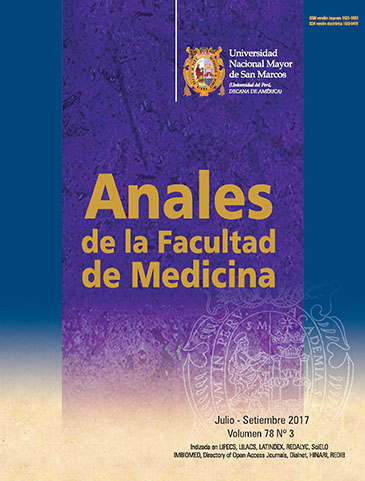Influence of teaching-health care integration on the quality of first level health services and medical education at San Antonio de Abad del Cusco National University
DOI:
https://doi.org/10.15381/anales.v78i3.13766Keywords:
Pan American Health Organization, Teaching Care Integration Services, Health Services, Medical Education, Patient Satisfaction.Abstract
Introduction: The Pan American Health Organization (PAHO) promotes medical education with emphasis on the social component, through teaching care integration (TCI) defined as the process of articulation between health service and education institutions to contribute to improving the living conditions of the community by provision of adequate services to the real needs of the population. Objective: To determine whether if the teaching care integration influences in improving the quality of health services in the community and in the integral training of physicians. Design: Observational, descriptive study. Setting: Faculty of Medicine of San Antonio Abad del Cusco National University and first level of health attention establishments in extreme poverty communities of Cusco, Peru. Participants: Users of health facilities, community families, health facility workers, local authorities, and internal medicine students. Interventions: Application of patients’ satisfaction survey to the care received in the establishments and communities where the teaching care integration was implemented; also surveys on knowledge, attitudes, and practices were applied. Results: The communities where the TCI was implemented showed greater satisfaction with the services received, in 48% of the users. Families (64%), health care workers (95%), and local authorities (86%) valued the work performed by the medical students through the rural intership as good. The students valued the rural boarding school as a contribution to their training in 81%. Conclusions: The teaching care integration contributed to improving health and quality of health services in the communities, and influenced the training and performance of the future physicians.Downloads
Published
2017-11-30
Issue
Section
Artículo Original
License
Copyright (c) 2017 Santiago Máximo Saco Méndez, Salomón Zavala Sarrio

This work is licensed under a Creative Commons Attribution-NonCommercial-ShareAlike 4.0 International License.
Those authors who have publications with this magazine accept the following terms:
- Authors will retain their copyrights and guarantee the journal the right of first publication of their work, which will be simultaneously subject to Creative Commons Attribution License that allows third parties to share the work as long as its author and its first publication this magazine are indicated.
- Authors may adopt other non-exclusive licensing agreements for the distribution of the version of the published work (eg, deposit it in an institutional electronic file or publish it in a monographic volume) provided that the initial publication in this magazine is indicated.
- Authors are allowed and recommended to disseminate their work over the Internet (eg: in institutional telematic archives or on their website) before and during the submission process, which It can produce interesting exchanges and increase quotes from the published work. (See El efecto del acceso abierto ).
How to Cite
1.
Saco-Méndez SM, Zavala-Sarrio S. Influence of teaching-health care integration on the quality of first level health services and medical education at San Antonio de Abad del Cusco National University. An Fac med [Internet]. 2017 Nov. 30 [cited 2025 Jun. 19];78(3):309-14. Available from: https://revistasinvestigacion.unmsm.edu.pe/index.php/anales/article/view/13766



